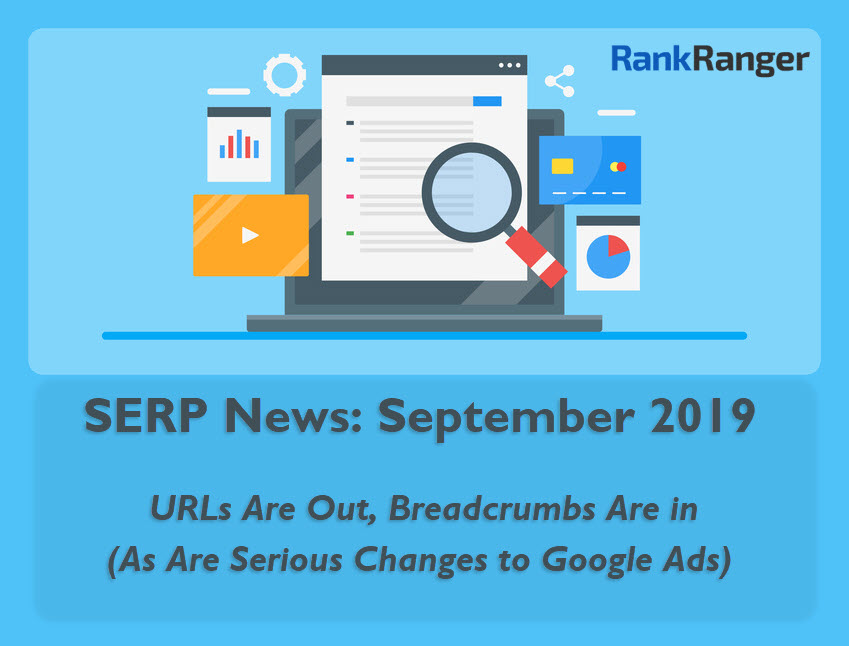
Posted by
Shay Harel
Mobile continues to be the pied piper to desktop’s SERP layout as Google seems to have moved on from the URL in favor of breadcrumbs. Google Ads brings the meaning of “close variants” to a whole new level while it announces the average position metric will die. Plus, a new podcast carousel hits the SERP while Google moves its “Featured Snippet anchor highlights” beyond AMP and gives hotels access to edit their amenities inside the Local Panel! Oh, and there were more Google bugs too…
Welcome to the September edition of the SERP News covering the memorable month of August 2019!

Blazing a New Trail on Desktop with Breadcrumbs!
‘Mobile-first’ is a nomenclature that applies well beyond indexing. For years, Google has “stolen” mobile SERP UI and formatting for desktop use (see the Sports Answer Box or some versions of the Knowledge Panel for instance). In late August 2019, Google brought its mobile-centric way of life to the desktop URL. On August 22nd, our SERP Feature Tracker saw the percentage of page one SERPS with at least one ‘breadcrumb’ skyrocket to 99%. More than that, the average number of desktop results that come along with a breadcrumb on the desktop SERP moved from 3 results to an astounding 8!

As you can clearly see below, the new numbers for desktop breadcrumbs now mirror what we’ve traditionally tracked on the mobile SERP for some time now:

Now, if you’re a true skeptic, or you just don’t believe data for some crazy reason, Google also ran a test that turned the very look of the desktop SERP into what we’ve become accustomed to seeing on the mobile SERP. If you’ll recall, back in May 2019, Google introduced favicons to the mobile SERP and moved the URL above the title while making it a bit smaller and removing its traditional green coloring. Well, just a day or two after going ‘full-on breadcrumb’ desktop saw Google going full-on mobile SERP by testing breadcrumb heavy URLs that sat above a result’s title next to a favicon with the URL being smaller and yes, colorless!
A Hodgepodge of Super Significant Changes to Google Ads
August brought with it an unusual volume of major changes to Google Ads. Whether it be to measurement metrics or the very keywords your ads will appear for, seriously significant changes have come to and are headed to Google Ads.
Google Ads Close Variants Close in on Synonymous Keywords
As August rolled in, the SEM community got some news as to what Google will consider a “close variant” of a keyword. In the past, Google using “close variants” of your keywords meant that Google would show your ads for misspellings or for keywords that were presented in a different order (i.e., men’s haircut cost vs. cost to get man’s haircut).
Now Google will show your ads for keywords that are deemed to be synonymous. For example, let’s say you bid on the keyword men’s haircut. With the new way close variants will be used, your ads may appear on the SERP for men’s hairstyling.
The obvious concern is that you seemingly have less control over which keywords trigger your ads. Google thinking a term is synonymous doesn’t mean that you do, certainly when conversions are concerned (and how various incarnations of a term can impact them).
Google Ads Kicks Average Position to the Curb
We all knew it was going to happen, but now we know when. Since February 2019, we knew Google Ads was going to kick the average position metric to the curb in favor of a series of “impression oriented measurements.” That said, we did not know when that would happen, until now. As of September 30th, Google Ads will no longer employ the average position metric.
In its stead, Google will go with the ad position metrics it announced in November of 2018. These new metrics include a measurement of the percentage of your ad impressions that result from your ad being in the top position on the SERP as well as the percentage of impressions that appear above the organic results, no matter the specific ad positioning.
The Google Ads Optimization Score Lands in the Cart of Your Shopping Campaigns
The Google Ads optimization score is an easy to use “grade” telling you how well you’ve set up your account/campaign. As of mid-August, Google has begun showing an optimization score for your shopping ad campaigns… as it had not done so in the past (duh). The score will be a separate grading for your search ads, but there is also an overall scoring that applies to your entire ads account.
Google Legalizes Fantasy Sports Ads
In case you’re clueless about the world of sports, there is a zany thing people do where they pretend to draft players, create “teams,” track the performance of these players, and compete against other people who do the same thing as part of a fake, I mean fantasy, sports league. Of course, the winner of any given league wins the purse, making fantasy sports leagues a form of ********. As such, Google did not accept ads from fantasy sports league services for SERP placement. (A sports purist like myself hates these leagues because they take the focus off actual teams and onto the performance of specific players who might actually be playing against your team. Just in case you care what I think about fantasy sports.)
Fantasy sports ads are now no longer Google Ads contraband. Google has said they will allow fantasy sports providers to advertise on the SERP in the US. I speculate this has everything to do with the US Supreme Court turning sports ******* over to the individual states with many states subsequently legalizing sports ******* (which is why Google’s allowance only applies to select states).
Google Ads Getting Truncated
Circa August 15th, a blizzard of reports came out saying that Google was truncating ad copy. According to Search Engine Land’s Ginny Marvin, the truncation is the result of how Google now presents text ads. Specifically, Google seems to be showing just one line for the description which results in the observed truncation happening more often than in the past.

A Google Ad showing truncation in an ad that contains just one line within its description
The SERP Roundup for August 2019
August was another big month for changes, tests, and all sorts of updates to Google’s SERP and the features found on it! From big news for Featured Snippets to videos in the People Also Ask box to new Local Pack delivery options, here are Google’s latest SERP machinations!
Featured Snippet Freshness & Highlighted Content
First off, some new old news about Featured Snippets. On the very first day of August, Google announced that it is now using a freshness algorithm to make sure the content inside a Featured Snippet is not outdated. In fact, Google, in a twist worthy of the next horrible incarnation of Star Wars, said it had been employing this algorithm since February 2019!
Personally, I think the algorithm does more than prevent stale content from appearing in a Featured Snippet. This “new” algorithm, as I see it, puts oven-fresh content into a Featured Snippet faster than you can say Jack Robinson. That is, new content… fresh content, is making its way into the Featured Snippet faster than ever before.
And now for Featured Snippet item #2… highlighted anchor text beyond the AMP page. If you’ll remember, back towards the start of 2019 Google started jumping users who clicked on a Featured Snippet URL to the specific part of the content the snippet came from. This content was highlighted on the page and the functionality only applied to AMP pages.
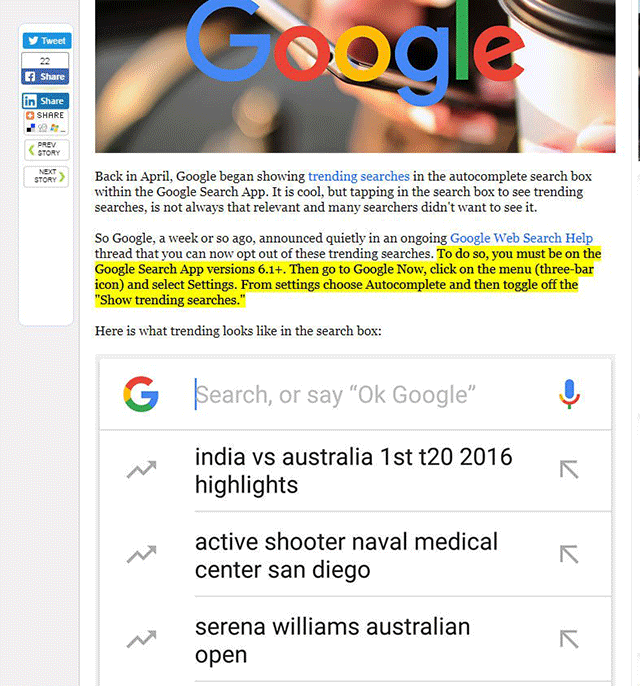
A webpage showing highlights that align to the content found within a Featured Snippet on desktop (Image Source: SERoundtable.com)
Now, Google is testing the same functionality on desktop. The test takes the user from the Featured Snippet to the exact spot on the page that represents the snippet’s content (highlighting that content along the way) and it does so for pages that are not AMP! In a rare move, Google actually confirmed the test and said it applied to roughly 5% of Featured Snippets.
The People Also Ask Box Goes Video
The Featured Snippet’s step-sibling, Related Questions (or as you probably know them, the People Also Ask box), has started to show video content within its expandable tabs.
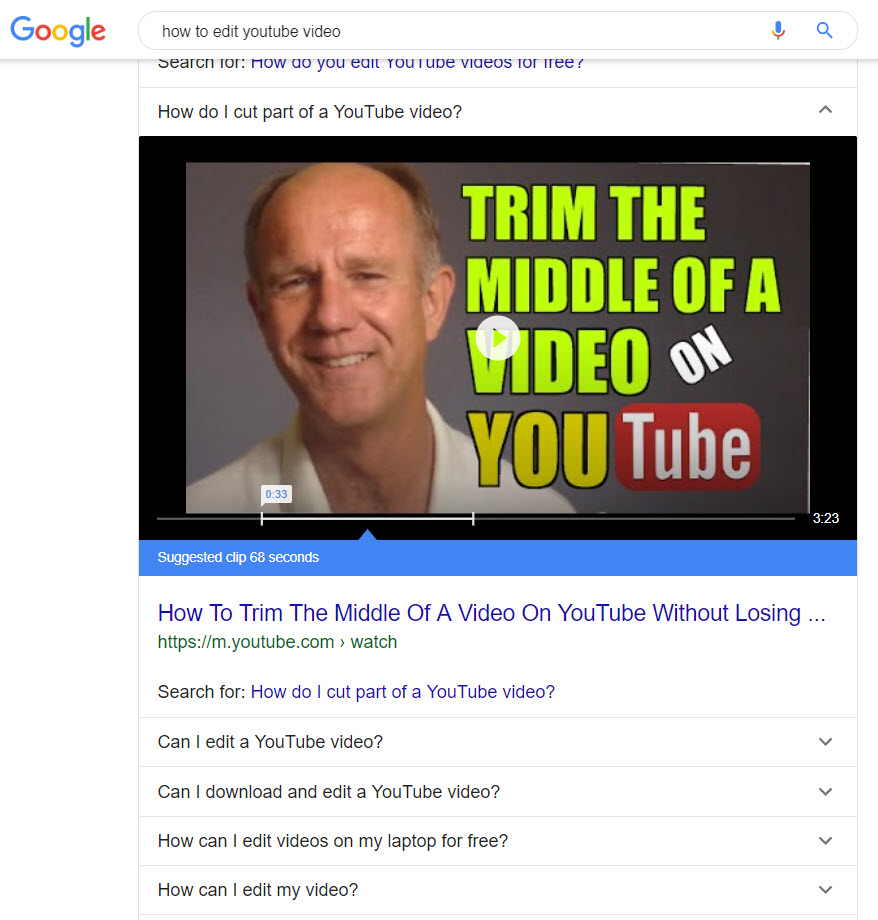
Like Featured Snippets, the People Also Ask box now displays video content within its results
Until this point, and as odd as it may sound, no videos were shown within the SERP feature. Of course, the Featured Snippet has shown video content for quite some time which makes it a bit surprising that we’re only now seeing such content in the People Also Ask (PAA) box. The only reason I can see as to why Google had not shown video content in the PAA box until now is that the user engaging with the PAA box may be looking for an exceedingly quick and focused experience. In such a scenario, even video content that starts at the precise moment of contextual relevancy (like videos in the Featured Snippet do) would still be too much of an elongated user experience. Just a thought.
AMP – Back in the News with Search Console Data & Custom JavaScript
Here’s a topic we have not talked about in a bit… AMP. August presented a few updates to Google’s site speed programming.
- True to their word, Google has added ‘swipe to visit’ data to Search Console. Swipe to visit allows an Image Search user to access the page an image is hosted on by… swiping up. The functionality applies to AMP pages and only AMP pages.
- For all you lovers of JavaScript (i.e., all of us), Google said that you can add custom JavaScript to your AMP pages! Note, each individual script must be smaller than 150kb!
From Deliveries to Hotel Amenities – August’s Local SERP Feature Scene
Some meaningful SERP changes to the world of local search in August:
- The Local Pack Delivers: Literally. Google has added a delivery icon to the Local Pack. Why does this matter? Well, do you want to be the only listing that does not show a clear option to have food show up at your customer’s door? I didn’t think so. Personally, I have not been able to replicate this as of yet.
- Top Spot Ad in Carousel Format: Google has been and I am sure will continue to experiment with a Local Pack carousel format. What’s novel here is that a recent test had an ad stuck above the carousel within the Local Pack!
- Editable Hotel Amenities: The Local Panel for hotels has long shown the various amenities available at a given hotel. Now hotels can edit that list of amenities within their Google My Business accounts.
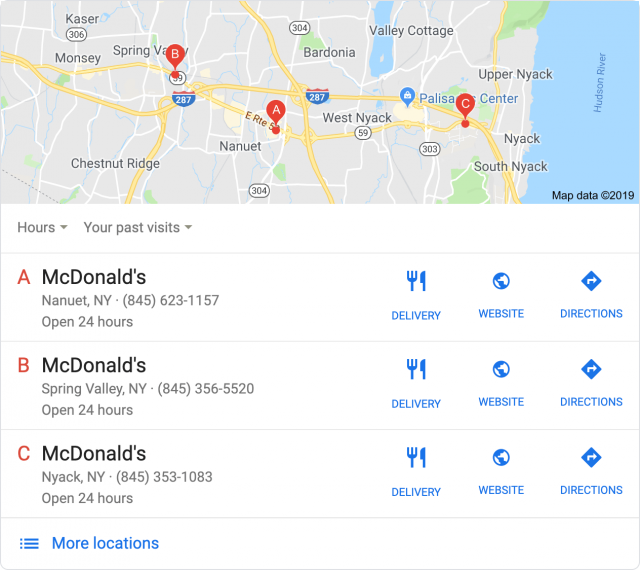
A Local Pack showing a delivery icon (Image Source: SERoundtable)
New Image Search Preview Box
Google, after a long testing period, has finally released its new Image Search preview.
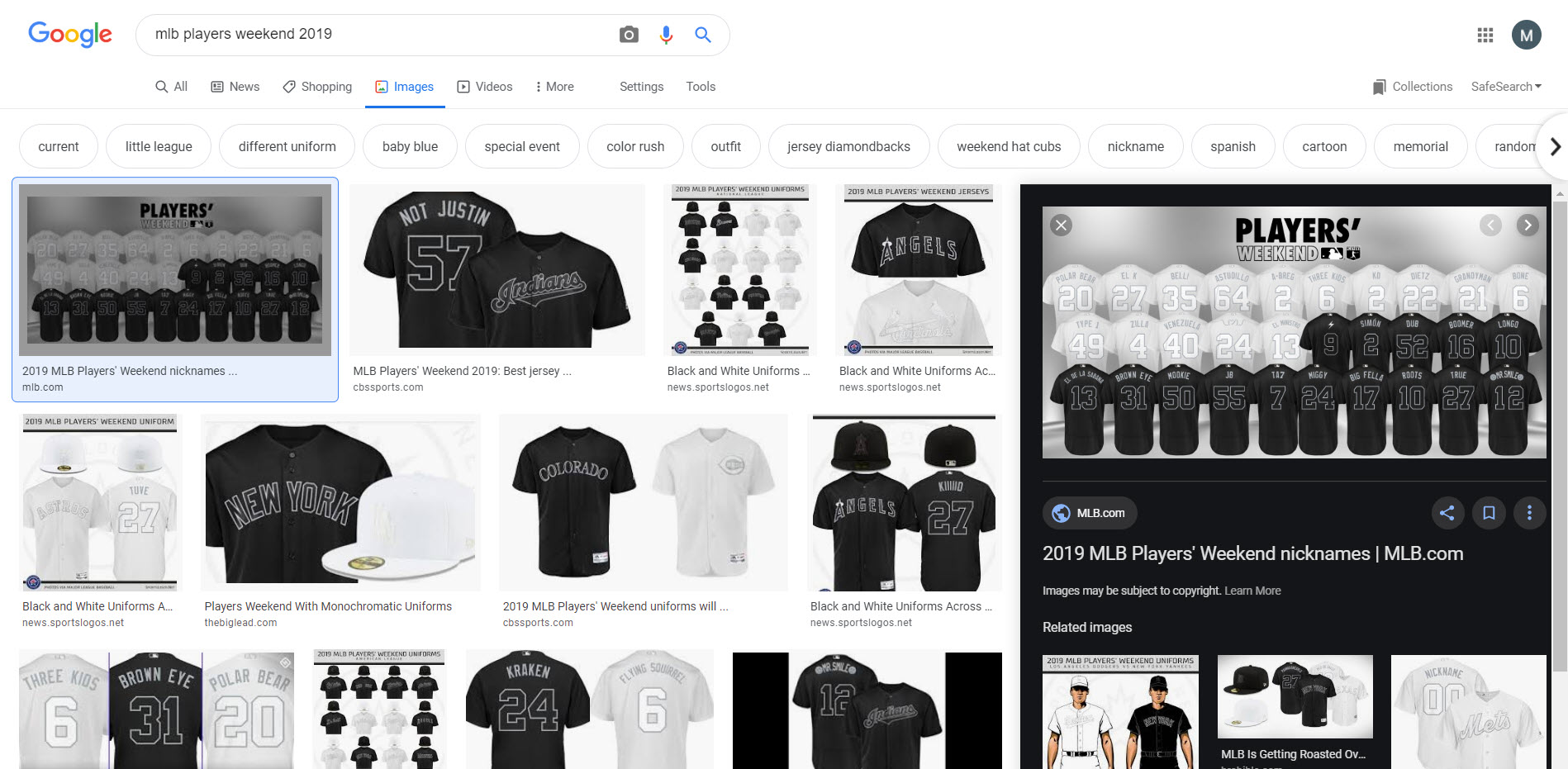
The new image preview format has the preview box appearing at the right-hand side of the Image Search SERP
The new preview appears to the right of the screen and sticks to the screen as you move down the Image SERP. It’s simply a massive box that contains a ton of related images among other image details. I personally do not like the new format at all. It dominates the page and I find the right-hand placement to be awkward. Unfortunately for me, I was the first to spot this test and have been stuck with it since April…. Lucky me.
Google Experiments with Pagination Formats
Oddly enough there were multiple tests to how Google went about pagination on the desktop SERP in August. These tests included infinite scroll (yes, on desktop), a ‘More Results’ button, etc.
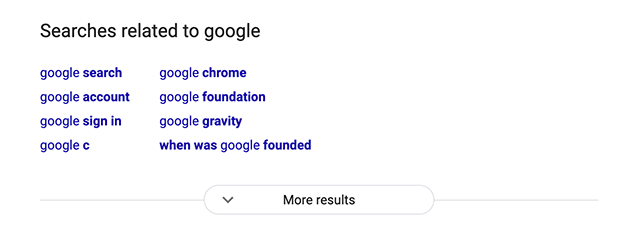
A ‘More results’ button, typically found on the mobile SERP, being tested on desktop (Image Source: SERoundtable.com)
Infinite scroll would be a total game-changer as it would blur the lines of what is considered a ‘page one’ result and what is not. Knowing this, Google, when running its test, employed a really bizarre looking divider indicating what page the scroll had placed the user on. Even with the divider, infinite scroll is a big deal. I really don’t like the notion of it on either mobile or desktop.
Podcasts Become a Standalone SERP Feature
May saw Google add podcast episodes to a site’s organic results. August saw the advent of a brand-new podcast carousel SERP feature. As opposed to being tied to a specific result, the new podcast carousel is keyword-based and therefore shows all sorts of podcasts that relate to the query.

Google’s new podcast carousel for the query ‘SEO podcasts’ produces a card for our very own In Search SEO Podcast
New to the SERP – ‘People Also View’
Speaking of new SERP features, another new carousel was spotted on the SERP… the ‘People Also View’ carousel. To me, the feature seems like Google’s Top Stories carousel but for content unrelated to current events (wow, I have not used that term since 4th-grade social studies class). That is, the carousel seems to be a means towards extending your content journey when the query is not related to news content. It’s almost like a modern-day version of In-depth Articles.
Expandable People Also Search For Results
Google has expanded the ‘People Also Search For’ feature. An August 22nd SERP test presented users with the option to expand the People Also Search For carousel on mobile.
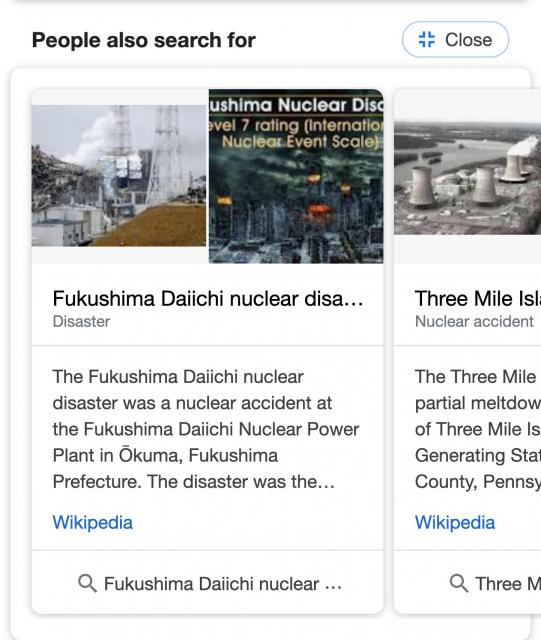
The expandable ‘People Also Search For’ carousel as tested on the August SERP (Image Source: SERoundtable.com via Valentin Pletzer)
Upon expansion, the feature, which normally offers an image along with what equates to a title, presented users with a snippet of content. Following the content contained in each card was the name of the site sourced, which yes, was clickable.
Google Stories Go Live
Wrapping up our SERP feature adventure for the month… Google Stories that correspond to live sporting events. One day in the not too distant past, I checked up on the score for the Yankees game and saw a large image with an icon that suggested it was a Google Story appear within the Knowledge Panel. Sure enough, it was a Google Story.
However, that’s not the interesting part (though it would indicate an expansion of the story format to new content categories). No, what was really interesting was that the stories are being constantly updated as the game goes on. I checked the new feature during the game’s 7th inning (a baseball game has nine innings) and then again just minutes after the game was over. Even though the game had just ended, the story was updated to include the highlights of the game’s final innings!
Oh, by the way, this Google Story format includes sound and a shareable link:
Awesome! Google’s showing highlights as a Google Story w. sound. The story has an actual link https://t.co/anM9Z2neZM & is being updated as the game goes on! I watched it in the 7th inning & 10 seconds after the game was over & the highlights were updated. #SEO cc: @rustybrick pic.twitter.com/CvEjRF7zr6
— Mordy Oberstein (@MordyOberstein) August 28, 2019
New Content Continues to Face Indexation Bugs
Lastly, some more Google bugs surfaced in August. Early in the month, big-name news publishers reported that their latest content was not being indexed by Google. The search engine indeed said there was an issue and that it would be resolved. No further reports came out, so one can only assume the bug was quickly resolved.
About two weeks later reports resurfaced saying that there was again a “new content” indexation issue. In this instance, it appeared that only some sites were having indexation difficulty. Despite what seemed to be evidence to the contrary, Google ultimately said there was no indexation issue. Not much ever came of the issues, so I would again assume whatever was happening, if anything, was quickly resolved.
Fashioning Formats Spell SERP Synchronicity

What we’ve seen on the SERP throughout August is a part of a longstanding theme to move desktop functionality over to a more mobile format. We’ve seen Google introduce a mobile-focused look for some of its SERP features in the past and of course, we live in the age of mobile indexation. Still, it’s somewhat telling of how Google sees the world when it tests a mobile SERP layout on desktop. It means something when Google introduces its ‘breadcrumb’ obsession to the desktop SERP.
A mobile SERP format on desktop means that Google feels the user expects a mobile-like experience anywhere and everywhere they go. According to Google, the psychological UX and UI paradigm is the one found on mobile. Good to know.
Thank you for joining me for this month’s edition of the SERP News! Keep on the lookout for all-new great content on the Rank Ranger blog & be sure to keep your eyes peeled for next month’s SERP News.




